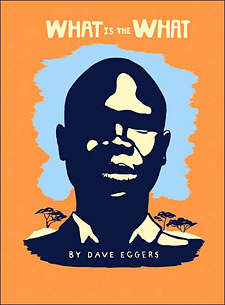 This is a postmodern book in a really interesting sense. It takes the true story of one of the "Lost Boys" of the Sudan, Valentino Achak Deng, and fictionalises it. The lost boys were thousands of orphans who fled the civil war and ended up in Ethiopia. Some of them were conscripted into the rebel army.
This is a postmodern book in a really interesting sense. It takes the true story of one of the "Lost Boys" of the Sudan, Valentino Achak Deng, and fictionalises it. The lost boys were thousands of orphans who fled the civil war and ended up in Ethiopia. Some of them were conscripted into the rebel army.
Perhaps because we modern readers are becoming desensitised to such stories of the horrors of Africa, Eggers chooses this fictional mode, which in some ways makes it easier to read about the raping and pillaging and torture and murder… In the end, it is impossible to tell which is biography, and which is made up, although in the foreword Valentino says it is substantially his story.
Valentino is "rescued" and taken to America, but when he arrives he is stunned by the culture shock. Many of the conflicts in his home country are translated to the new context. He would still rather be home, but it is impossible to go back.
It made me think of the Somalis recently arrested for planning terrorist attacks in Australia. While there is no way such violence could be condoned, this book helped me to understand the issues of a displaced person. The reality is that many of the conflicts in Africa have been fuelled by western imperialism, greed for oil, and military aid aimed at protecting western political or business interests.
Valentino is poorly treated in his adopted country, and many do not ask and could not comprehend all that he has seen and lived through.
This book helped me realise we have such a simplistic view of refugees… we assume they would be grateful for having a safe place to live; which is right on one level. However, refugees do not arrive at their adopted country by choice. It is more about leaving suffering than choosing the new place. Mostly they would like to be with family and friends. Any country would seem alien after their experiences.
Another really interesting idea is that of the "What', from the title. The origin is a Sudanese creation story.
After God created men and women, according to the legend, he gave them cattle, the source of "milk and meat and prosperity of every kind". But God offered humankind a choice: "You can either have these cattle, as my gift to you, or you can have the What."
The Dinka (Valentino’s tribe) wisely chose the cow. But others picked, and continue to seek, the mysterious, unnamable, destructive and possibly unattainable "What'.
As Valentino goes on his journey he sees people choosing power, land, oil, wealth, violence…
That story has relevance for us, and the choices we make. Do we receive the gifts God intends for us of relationship and community, as well as all we need to worship and serve him and others; or do we keep wanting other things… coveting… demanding…
In the end this is an engrossing story of survival, akin to the stories of the polar explorers ; and journey through adolescence, an African version of Huckleberry Finn. Valentino survives attacks by killers on horseback, attacks by helicopters and tanks, slave traders, lion kills, a desert crossing, a swim across a crocodile-infested river, months of walking, the threat of dysentery and malaria… He sees family members brutalised and buries his childhood friend. We read this catalogue of horror through the eyes of young boy, and it horrifies but is not sensationalised or glorified.
It is also a great insight into the world of refugee camps. Valentino spent a total of almost 14 years in refugee camps - an astonishing thing to comprehend, since we tend to think of such camps as temporary places.
This book is cause for reflection on the sin in the world, the desire to survive, the complexity of the mess we humans make.
Valentino identifies as a Christian, and prays to God, but on my reading he does not have a personal awareness of Jesus, nor a deep knowledge of the Bible. However, it is Christians that assist him in the US, that provide for him and sponsor him, and help him to receive some of the medical treatment he needs. Their example of love and care is distinctive for him.
The author Eggers met Valentino at a charity event, and they became friends. Eggers travelled to the Sudan with Valentino to retrace his steps. Proceeds from the book will go to paying for Valentino’s university education, and also to rebuild his village in the Sudan.
Reviewers from The Observer and the New York Times have described the book as transformative, and I would hope that we would still be affected by such stories, and want to respond.


























